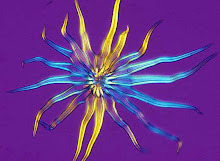There's a delightful Country Diary in the Guardian today by Derek Niemann about Gamlingay Great Heath in Cambridgeshire, that reminded me of a fascinating historical artifact linked to this location that I came across a few years ago.
Once or twice each year, I delve into the darkened corners of our herbarium in the basement of Durham University’s School of Biological and Biomedical Sciences to dig out a few plant specimens for an undergraduate tutorial. The herbarium is permeated by the faint smell of mothballs and lined from floor to ceiling with cupboards crammed with foolscap manila folders containing thousands of pressed flowers.
It’s a relic of a more romantic age in science, when botanists spent long summer afternoons roaming woods, heaths and hillsides in search of rare or unusual plants, trying to make sense of their relationships and unpredictable distributions. Whenever I go down to the herbarium I can’t resist taking a peek at one particular specimen of bracken fern labelled, in elegant, flowing handwriting, Pteris aquilina Gamlingay Cambridgeshire 17th. August 1831 J.S. Henslow.
It’s the signature and date that’s interesting, not the specimen. John Stevens Henslow, Reverend Professor of Botany at Cambridge University, amassed a personal herbarium of thousands of sheets of pressed plants. Somehow this single stray specimen found its way into the Durham University herbarium. And on the day that he collected it Henslow might have been wrestling with an urgent decision that - unbeknown to him - would dictate the course of history.
Just a few days before, on August 13th. 1831, he’d received a letter asking him to recommend a suitable gentleman ship’s naturalist to accompany Captain Robert Fitzroy, captain of HMS Beagle, on a circumnavigation of the world. Henslow, the finest field botanist of his day, would have been the prime candidate but family responsibilities stood in his way. His next thought was to nominate his brother-in-law, Reverend Leonard Jenyns, but he declined in favour of tending to the spiritual needs of his parishioners. So by the end of August Henslow had offered the job to Charles Darwin, his student protégé at Cambridge. The rest is (natural) history.
I like to imagine Henslow mulling over the problem of who to nominate while he botanised through Gamlingay Woods on the summer day when he collected the bracken specimen. If Henslow, a creationist until the day he died in 1861, or his cleric brother-in-law, had sailed with Fitzroy it’s unlikely that they would have come up with a theory of evolution. Charles Darwin’s date with destiny would never have arrived. It would have been left to some other scientist, in another place and at another time, to provide the theory that underpins all of modern biological science.
For informatio on another historically interesting herbarium specimen click here.

























Well I never, on such minutia is history made.
ReplyDeleteGreat and thanks.
Fascinating.... and I'll always look at bracken a little differently, too!
ReplyDeleteTop post again Phil.
ReplyDeleteI never knew any of that; I always learn so much when I visit.
Very cool! And now through your blog, this bracken collected in 1831 and the story of its collector's influence on how we think about our natural world has become untethered from its physicality to enter the aether.
ReplyDeleteInteresting post, as always. I like the way you build up the suspense.
ReplyDeleteA fascinating piece of history Phil.
ReplyDeleteHi Adrian, I think it's the details that often make history fascinating...
ReplyDeleteHi Valerianna,I don't know whether Henslow had a particular interest in ferns, or whether he anted this just to make his collection more complete..
ReplyDeleteHi Keith, the web is great form sleuthing interesting links and stories
ReplyDeleteHi Wilma, I guess that herbarium sheet could have remained buried in the pile for decades or centuries - I only came across it through pure serendipity. I've never found any of his other sheets in the herbarium...
ReplyDeleteHi lotusleaf, I like science with a storyline...
ReplyDeleteHi John,Henslow was a really interesting man - without his help, Darwin might never have become a naturalist
ReplyDelete